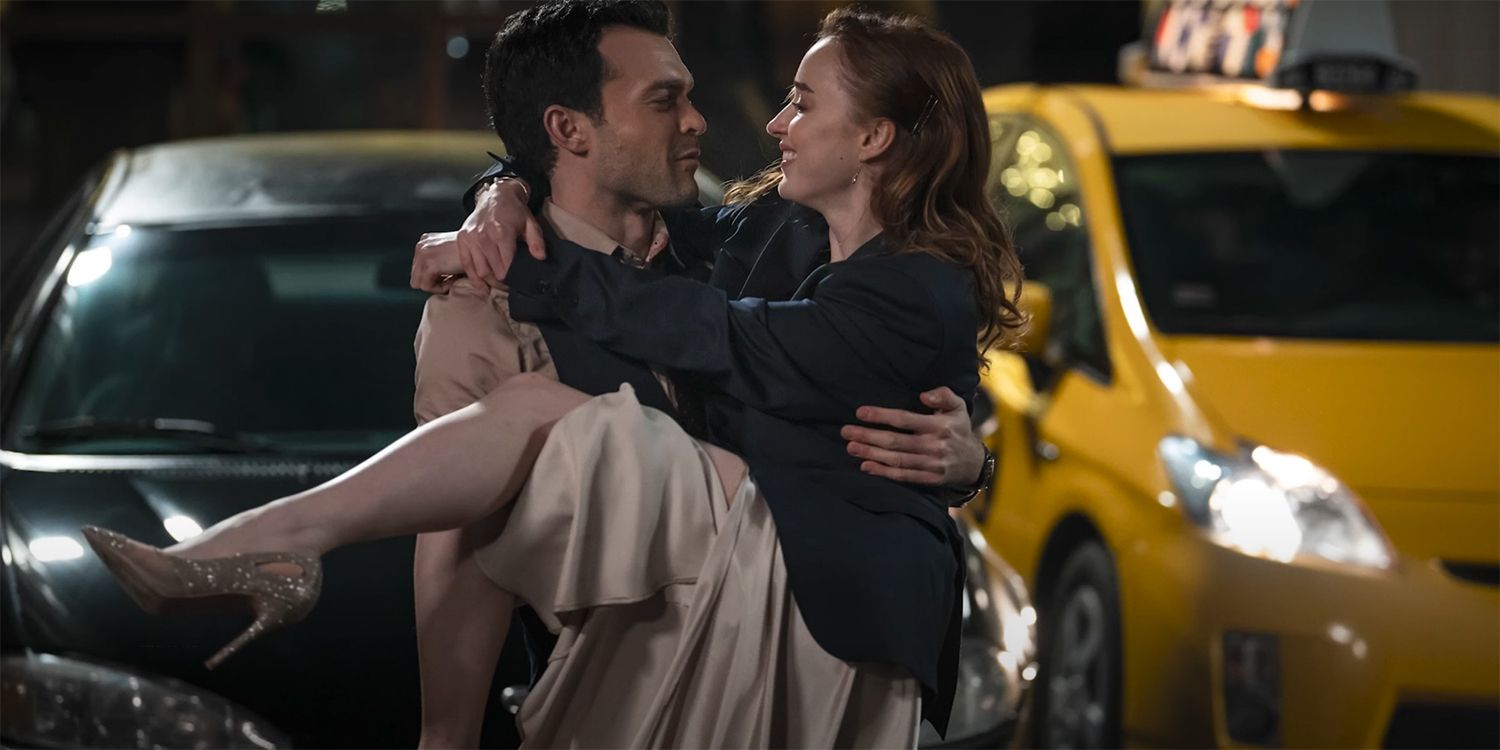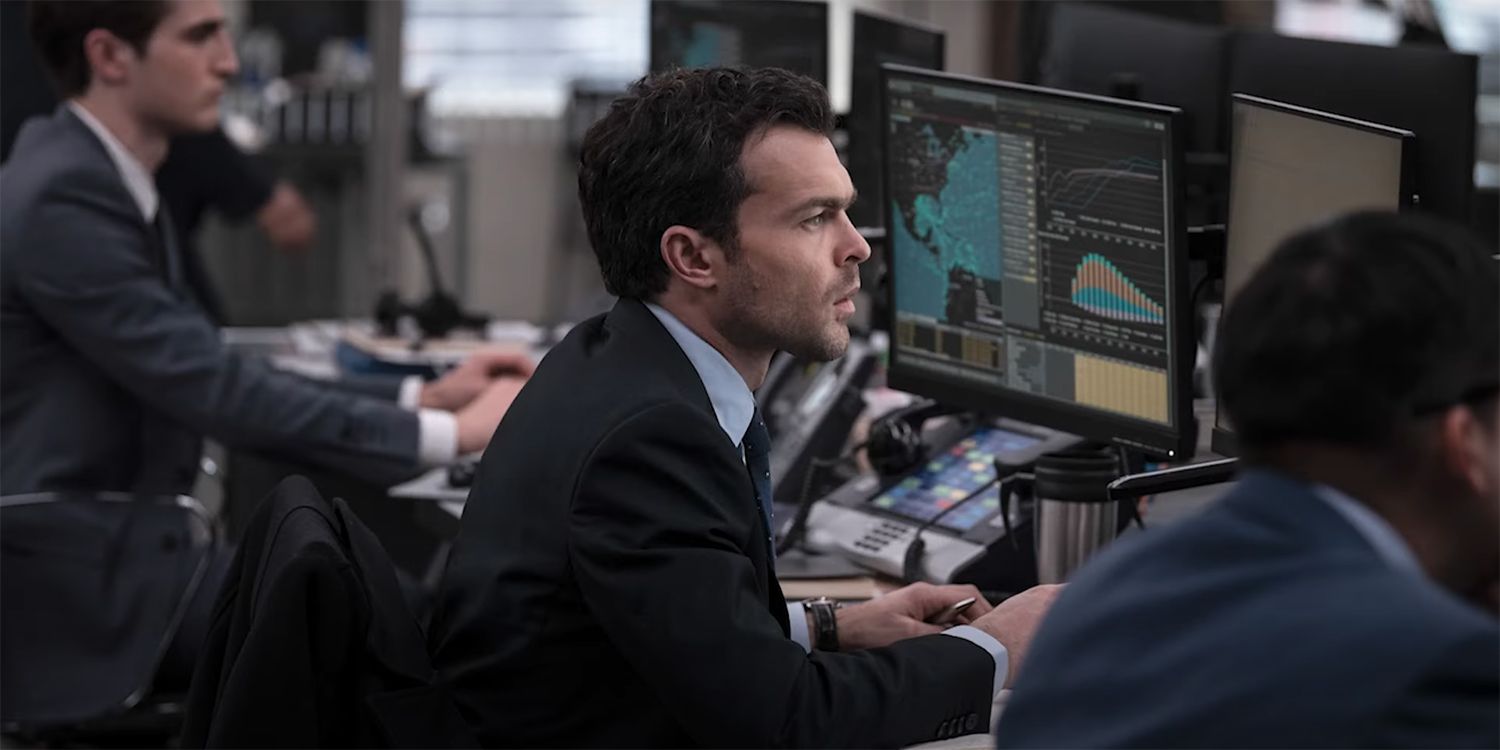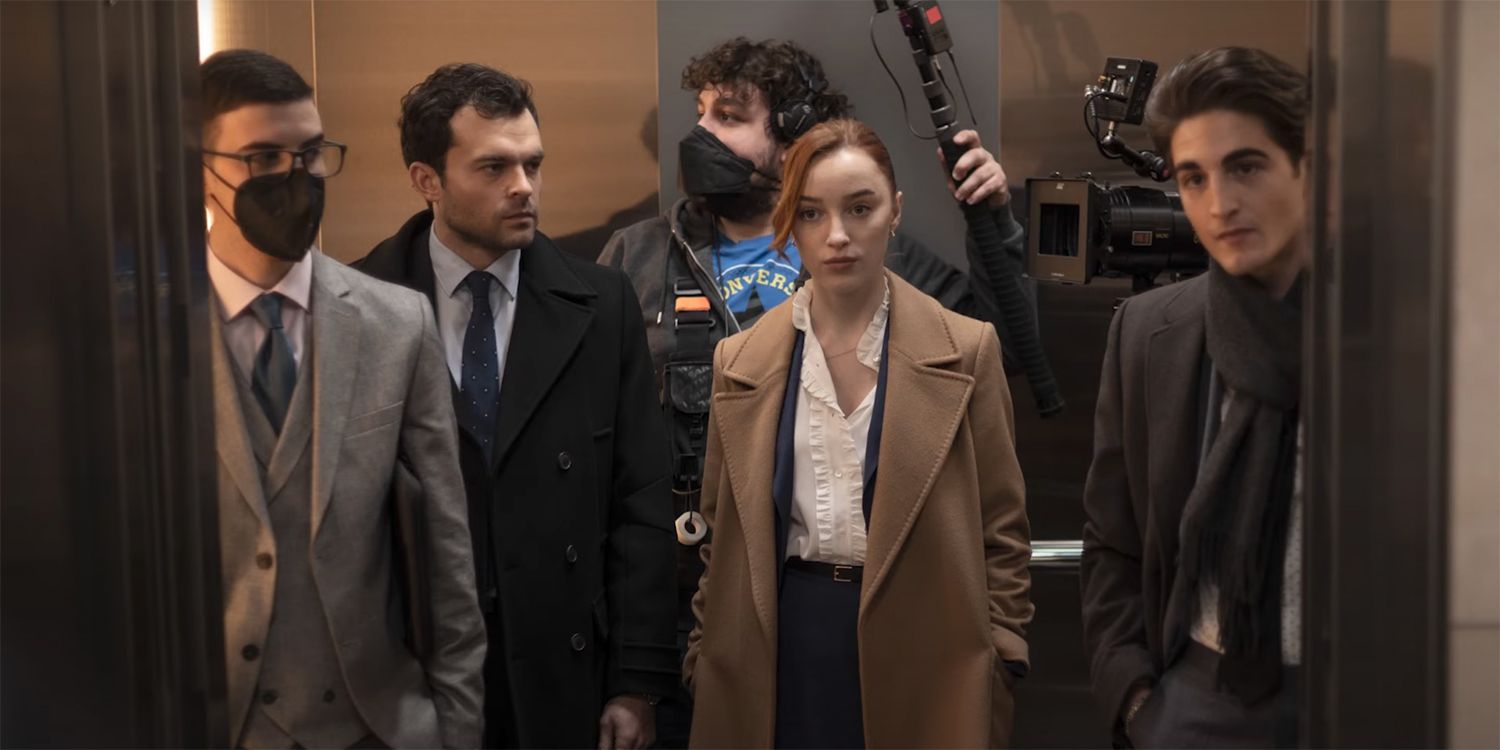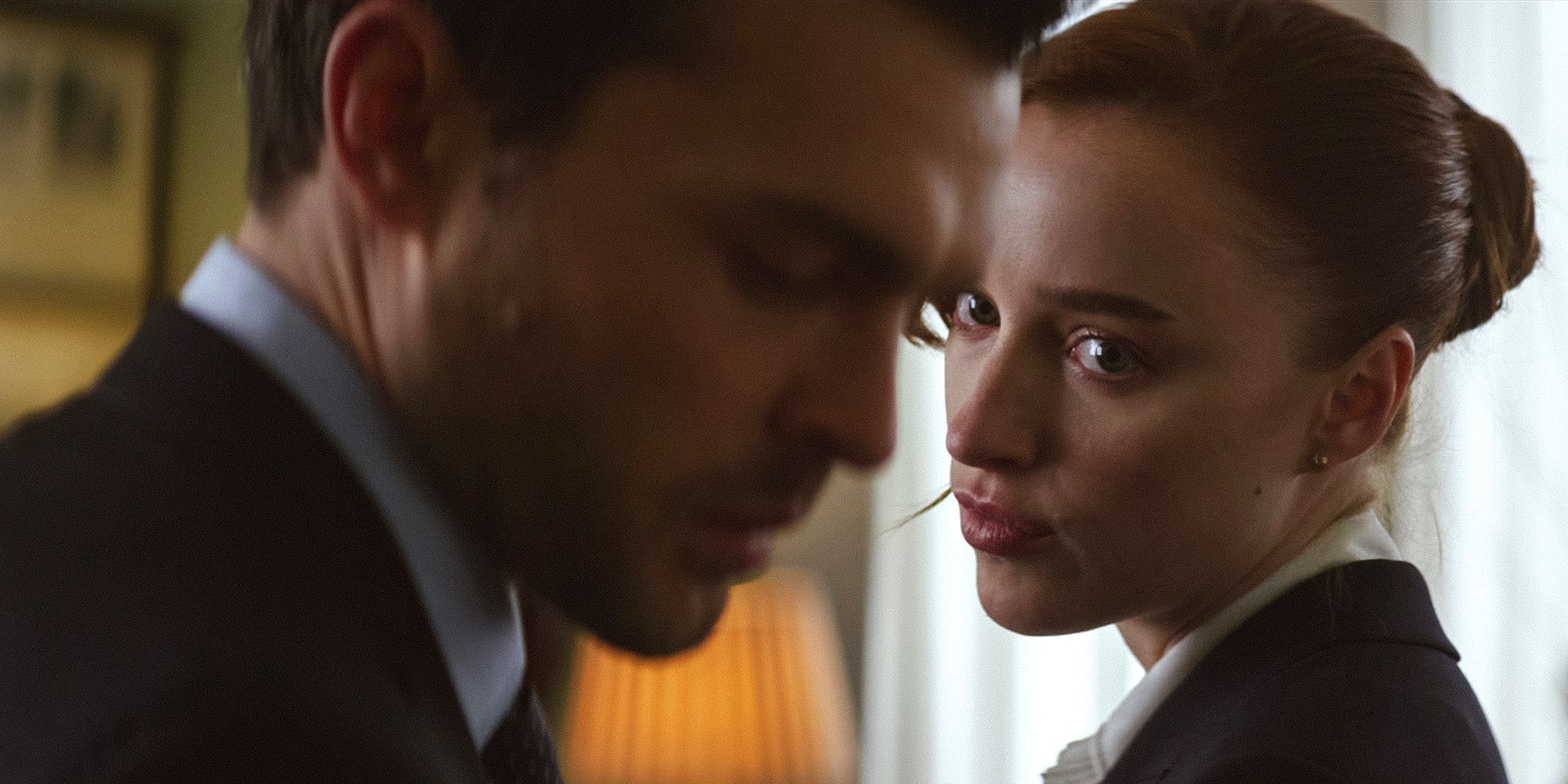Chloe Domont's Fair Play is perhaps the biggest Sundance success story of 2023. Shortly after the film's January 20th premiere, Fair Play was sold to Netflix for a staggering $20 million, which was the biggest deal of the year. Fair Play is a thrilling ride and a discussion on gender roles, societal conditioning, and competition, all in the context of a romantic relationship. The film stars Phoebe Dynevor (Bridgerton) and Alden Ehrenreich (Solo: A Star Wars Story), who portray the couple at the heart of the film's story.
In addition to strong writing, direction, and performances, a key element in the tension and release of Fair Play is the musical score by Brian Mcomber. While this not Mcomber's first time at Sundance Film Festival, the composer's background was not necessarily in scoring films. Mcomber began as a drummer and percussionist performing in a number of bands including the Dirty Projectors, and also had a career as a scientist; the composer studied molecular biology and ecology, originally engaging in music on the side of his scientific pursuits. It's fitting in some ways, then, that Mcomber's score for Fair Play feels both meticulous and experimental, with the composer pulling new sounds out of traditional instruments to deepen the impact of Domont's storytelling.
Mcomber spoke with Screen Rant about the techniques he used to come up with the unique score for Fair Play.
Brian Mcomber on Fair Play
Screen Rant: Congratulations on the Netflix deal; that's very exciting. When you take on a film project that doesn't have a guaranteed release or distribution, do you have to set certain expectations in your head, or do you just push that aside, dive into the work, and try to make it the best it can be?
Brian Mcomber: Yeah, I just try to dive into the work and make it the best it can be. A lot of films I work on don't necessarily have distribution or aren't sold before the fact. Some are, but [with] Sundance, usually, people go there because the films aren't sold yet and don't have distribution. If you're lucky enough to have your film get in there, there is a whole bunch of distributors ready to buy something, so I think that's what makes the festival really exciting.
I'm a musician, so I remember when I was younger in touring bands, you'd go to a festival like South by Southwest, and you'd play a bunch of shows, and hopefully a record label or an agent is there. [So,] I've done that on the music side as well. I think everybody involved with Fair Play couldn't be more thrilled with selling the film for what they did. I think I read somewhere it might have been the highest price anyone paid for a film this year, so everyone's really excited.
You mentioned you came up in bands; I read that you basically fell into film scoring because you were sitting next to a filmmaker on a plane, or at least that's part of the story. Did you ever study orchestration and counterpoint?
Brian Mcomber: Yeah, I was sitting next to somebody on the plane, and they were working on a thing in Final Cut, and I was working in Pro Tools at the time. We had a conversation, and I scored her film, and that film went to Sundance. Ever since then, I've just been getting more and more work, so there's some truth to that story. But, I'd always been making music and interested in all kinds of music, especially experimental music and music that I think a lot of people would describe in quotes as cinematic - not necessarily pop music. I'm not really a songwriter; I did not study music.
I studied molecular biology and ecology, but having a background in science allowed me to work at various universities over the years as a lab technician, doing research which allowed me to make money so that I could continue to do my weird band projects, most of which didn't make any money in the beginning. I'm just a self-taught musician, but I've been playing music since I was 10 years old, working and writing songs. More than anything, [my friends and I were] focusing on recording ourselves. We grew up in a really working-class neighborhood in southeastern Connecticut. Most of our parents were hippies and had stereos, and we would figure out how to use those stereos to make demo tapes. With combined [recording] equipment [worth about] $100 we would just start playing, making our own stuff, and recording it.
I was always interested, as a drummer, in the recording aspects, because the drum set is such a difficult thing to record. [It was], like, "Why don't we try the microphone underneath the snare drum now instead of on top of it?" Looking at images of live performances, I would be very interested to see where the microphones were set up, and that kind of stuff, so really, my foray into film music comes from mostly a percussion and producing background. I could never have been a film composer, before, like, 1990, because with computers and things like that nowadays, it is very easy to do it without spending a ton of money. I grew up inspired by people like Mike Watt and the Minutemen... you work with what you have, and the people around you.
I never went to music school, and never even had lessons, really. Later on, I did study a little bit, but that was because I was working at Wesleyan University as a biologist and I reached out to Pheeroan Aklaff, the percussion teacher there, and even some of the other people at Wesleyan. I was like, "I'm a professional film composer, but I don't really know how to read music. Could I sit in some classes?" They were pretty cool about it, and let me do so.
What about Fair Play drew you in and made you want to work on it?
Brian Mcomber: I was describing it as a feel bad romance. It's a thriller, borderline horror film. I read the scripts, and Chloe, the director, had reached out to me about it. I think some people are going to have a negative reaction to it, because she really wrote it into the script - it goes places that even in the film [you won't see]. She had to cut out some scenes that just go so hard; there's some real brutal stuff that she had to cut out. In test screenings, it was so intense that it was pulling audience members out. But I knew after talking to Chloe that she was confident in what she wanted, and she wasn't going to shy away from doing what she wanted and going to places that I don't think a lot of directors would have the guts to [go]. Reading that script and talking to Chloe - that's what made me excited about doing it.
I've been able to listen to some of your cues for the film. I really loved them, especially one called "The Hits". It sounds like your main instruments were percussion and strings. Was that your baseline for Fair Play, and how did you choose that instrumentation?
Brian Mcomber: Yeah, absolutely; that's it. The strings actually weren't part of the original conversation, but definitely percussion - definitely the sound of things being struck. [Chloe] was like, "I want to hear music that makes me feel like I've been slapped in the face, or been pinched really hard - enough so that it would leave bruises." That's what "The Hits" are, and we worked really hard on getting those hits.
They're heavily layered percussion sounds, [and] unusual ones at that. I would smack the body of a cello with a mallet, or I would take a piece of wood and run it across the strings of a cello. We also used prepared piano sounds, really dead, not resonant things, [and] the sound of different kinds of metal, wood, and skin, struck. [When those sounds are] layered, they give these dense textures. [We used] snaps - the sound of a finger snapping, [with] really hard, sharp attacks. Quick attacks, as far as the envelope or the timbre of the sound. That was the main first discussion.
The strings came in later, when we got past this idea of an anxiety-producing, ticking time bomb, rhythmic thing. [Chloe] wanted more anxious tones and textures, but also, we talked about strings because since it's set in the finance world, we wanted it to sound expensive and sexy. Strings just as an instrument [can convey that], even if you're not using them in a typical "classical way", and are abusing them in a lot of ways. Chloe, and the producers themselves loved the idea of abusing these expensive instruments as a general overall approach to the score. Playing the cellos with credit cards - they also liked that just as a metaphor.
There's another cue, "Sabotage" that has so many interesting sounds in it. Was that all done on the performance side, or were you also digitally manipulating things afterward?
Brian Mcomber: I'm definitely manipulating things too. That particular piece was one where we were trying to bring an element of fun to it. Without giving away what's happening there, we wanted to make it more fun, and so that's where I brought in some more typical percussion instruments, like a tambourine. That's the first time you hear a tambourine, which to me is like a party instrument. You hear a tambourine come out, or a cowbell, and you know what that is. To me, it makes it sound more fun.
There's [also] a cello line, and I mixed that with a synth, and I ran the cello itself through a bunch of effects to make it sound alien and weird. Everything there was about like timbre, too. Those cello notes that hit are not supposed to be played "good". Everything's being manipulated in ways that hopefully make it sound a little bit alien, but at the same time familiar. Clearly, it's percussion and strings, mostly, but they're being used in ways that aren't typical.
I imagine you're probably doing the percussion work yourself, but did you bring in string players? Or can you play those, too?
Brian Mcomber: I play strings horribly, but I did play all the percussion, and as a drummer, I can move my arms and hands really fast. I did play a lot of the string parts myself, but I brought in a string arranger, and we did do a little bit of live string recording with a quartet plus bass, just because it's going to sound better. A lot of the demos were done either by me or by Shaun, my arranger. We [had to] demo it for Chloe, and then we actually recorded all the strings after that, but a lot of it stayed in - a lot of my poor playing on the cello. I don't know if it's temp fever, or whatever, but oftentimes I think you might get attached to the way something sounds, or in the case with Chloe, our director, I think she just wanted these sounds. It was hard to find those hit sounds; the only way I really was able to get them was by, like, trashing the cello. [I was] literally hitting it with wood, or metal, or playing it with sticks, or a credit card, or something like that. Luckily, I have a beater cello, and laid it flat and just played it more like a drum than a cello.
Finally, this was your director Chloe's first feature. Did that put extra pressure on you as a composer, just to make sure you were getting everything right for this first project? Or were you not so worried about it?
Brian Mcomber: Well, I wasn't worried about her. She has such a clear vision, and such a talent, and has a lot of guts. I wasn't worried about her at all, but I get what you're saying, like [there]s a lot of pressure on me - her entire hopes and dreams and career, kind of. [But] Chloe's done a lot of other things. She's directed a lot of TV, and there's a great video of her with her editor directing Dwayne "The Rock" Johnson in an episode of this show Ballers.
She has experience; she's not just swinging her first film here. She had a whole team of people that knew her, knew her work, knew her skill set, and were just helping her are among the way. [She had] people like Rian Johnson, and people that are experienced filmmakers. But yeah, there is some pressure there, and I do feel it a little bit. I think Chloe would be the first to say [that] all of us, me included, went above and beyond what we might have thought we had to do in the beginning to make this film as good as it came out to be. I think all of us knew that putting in that extra mile was well worth it. Now, we've seen the final results, and yeah, it was absolutely worth it.
About Fair Play
In Chloe Domont's psychological thriller, freshly-engaged New York couple Emily (Phoebe Dynevor) and Luke (Alden Ehrenreich) come into conflict when the opportunity for a promotion arises at their work. Ambition, ego, social structures, and gender-based expectations take center stage as the couple's love devolves into competition and ruthlessness.
Fair Play premiered on January 20th at the 2023 Sundance Film Festival. The film is 113 minutes long and not yet rated.




